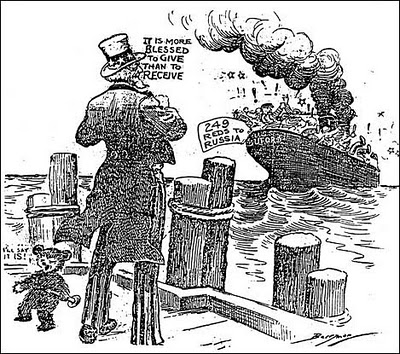The Espionge Act: Why it was created and the effect it had
The Espionage Act was passed by the U.S. Congress and signed into law by President Woodrow Wilson on June 15, 1917. This act along with its companion legislation The Sedition Act of 1918 were created primarily to quash organized opposition to American entrance into the First World War and to undermine the labour, pacifist, socialist, communist and anarchist movements which had steadily gaining momentum in the United States since the late 19th Century. The Act made it illegal to interfere with military recruitment (with the passage of the Sedition Act this included giving public speeches and writing and publishing of anti-war statements and indeed even anti espionage and sedition act statements!) It was also the instrument used against people who disclosed information relating to national defense. At the time the penalty if convicted was a 10, 000 $ fine and up to 20 years imprisonment. The law was contested from the moment of its inception as an unconstitutional violation of freedom of speech as well as freedom of the press.
The Espionage act was used to break the I.W.W.(Industrial Workers of the World aka One Big Union), imprison Eugene Debs (amongst many many others) and played a key role in the Red Scare (1919-1920). It led to the eventual mass deportation of so called ‘Enemy Aliens’ including Emma Goldman, Alexander Berkman , and approximately 800 others. In 1920 the provisions of the Sedition Act were repealed but the Espionage Act remained in place.
The Act was used intermittently over the ensuing years against accused Soviet spies, among them Julius and Ethel Rosenberg. The U.S. government tried to use the Act against Daniel Ellsberg and Anthony Russo for their roles as whistleblowers in the release of the Pentagon Papers, which exposed expansion of the Vietnam War and the illegal secret bombing campaigns in Laos and Cambodia. The Pentagon Papers also crucially detailed how the Administrations of Presidents Truman, Kennedy, Johnson, and Nixon had deliberately misled the American people about both their intentions and the scope of the war. The case was dismissed based on evidence of prosecutorial misconduct.
More recent use of The Espionage Act
The Obama administration has prosecuted a number of people under the Espionage Act since coming to power in 2009. As a part of his justice department’s crackdown on whistleblowers they have gone after former CIA agent Jeffrey Alexander Sterling for leaking information about a failed plot against Iran in the 1990’s which he allegedly released to the New York Times’ Jeffrey Risen. NSA official Thomas Andrews Drake who leaked information to the Baltimore Sun and the House Intelligence committee about the NSA’s Warrant-less Wiretapping program, a precursor to PRISIM. Shamai Leibowitz, an FBI translator working on translating the information gathered from the wiretaps the U.S. government had in place at the Israeli embassy in Washington released information about Israeli attempts to hasten a war with Iran to the Tikun Olam blog that focuses in part of Israeli security issues. Stephen Jin-Woo Kim, a State Department contractor has been charged under the act for disclosing information about planned North Korean nuclear tests to James Rosen of Fox News.
Recently, this nasty piece of legislation has been used to persecute Army whistleblower Bradley Manning for the release of U.S. Diplomatic Cables, Reykjavik13, the Afghan War Logs, the Iraq War Logs, the Guantanemo Bay Files and the July 12, 2007 Baghdad air strike known as Collateral Murder to Wikileaks. On July 30th 2013 a judge only military court marshal convicted him of 6 counts of violating the Espionage Act.
If they catch Edward Snowden he too will be persecuted under the auspices of the Espionage Act of 1917.




